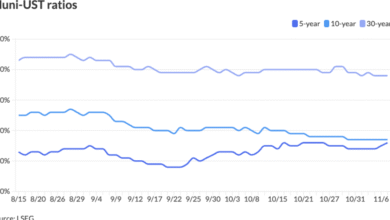Troubled nations return to debt markets amid yield hunt

Sovereign bonds from some of the riskiest borrowers are back.
by Zijia Song, Vinícius Andrade and Carolina Wilson
Some of the world’s riskiest sovereign borrowers are returning to international debt markets, taking advantage of increasing appetite for yield to sell bonds.
Suriname raised almost $1.6 billion with a debt sale this past week, two years after emerging out of default. It was the latest in a string of October bond deals, which also included Angola and Kenya, that investors say is likely to continue. They’re looking at Argentina next, with JPMorgan Chase & Co. saying market access is now a “plausible goal again” after President Javier Milei’s party clinched a win in midterms, triggering a massive relief rally. Meanwhile, CCC+-rated Laos is holding investor meetings for a benchmark-sized bond sale.
The isssuances also come as resilient global growth and expectations for lower policy rates have dialed up appetite for riskier assets. The spread for emerging-market governments bonds over Treasuries has fallen 127 basis points since April to a decade low, creating an opportunity for troubled nations to regain market access.
“The market is looking for high-yield issuers to come to market to actually put cash to work,” said Daniel Wood, a portfolio manager at William Blair Investment Management. With tight spreads in more traditional names, the new issuances have been “very well received by the market even though they issue in quite large size and aren’t leaving a large premium on the table.”
Angola raised $1.75 billion and Kenya sold $1.5 billion of debt in October deals, while Kyrgyzstan attracted over $2.1 billion in demand for $700 million of its first-ever international bond in May. Democratic Republic of Congo is also likely to tap the market soon, said Wood.
Inflows to EM have totaled more than $50 billion so far this year, as asset allocators’ need for diversification and expectations for easing US borrowing costs drove an outsize rally in the asset class. Even as Federal Reserve Chair Jerome Powell cautioned Wednesday that a December rate cut isn’t guaranteed, which took a toll on developing assets, traders continue to bet it’s the most likely outcome at the next policy meeting.
That’s good news for investors looking for elevated coupon rates from high-yield issuances, as spread for investment-grade sovereign EM bonds has narrowed to a historic low. For governments with coupon step-ups, amortizations and larger principal repayments, now is a chance to pre-fund next year’s budget and guide the market on expected funding sources for 2026, said Katrina Butt, a portfolio manager at AllianceBernstein in New York.
Appetite has extended to corporate sales from riskier borrowers too. This past week, a flurry of Argentine companies kicked off plans for bond offerings. Quiport, the operator and developer of the sole airport serving Ecuador’s capital, mandated banks ahead of a potential debt sale.
Argentina
Among sovereigns, Suriname is expected to use proceeds from its bond sale to prepay the 2033 bonds and the oil-linked value recovery instrument maturing in 2050, while Argentina has an upcoming debt payment of more than $4 billion in January, and about $9 billion due for the entire year.
Portfolio managers including Gramercy Funds Management, Neuberger Berman and Vontobel Asset Management say Argentina is now in a better position to return to the primary market. US Treasury Secretary Scott Bessent also said the market should “easily meet” the country’s refinancing needs.
“Lower bond yields create several possibilities,” said Robert Koenigsberger, founder and chief investment officer at Gramercy. “We’re getting a lot closer to Argentina being able to access the market to roll over maturities.”
While the South American nation still needs to address its foreign exchange policy, build up reserves and implement a series of reforms, a bond sale would be an important signal of market normalization and create a “virtuous loop,” said Gorky Urquieta, co-head of emerging-market debt at Neuberger Berman.
“Maybe you wind up paying something close to 10%, but the minute you validate your market access, your country risk goes down because now you can come pretty much anytime you want,” he said.
What to Watch
- South Korea, Indonesia, Taiwan, the Philippines and Pakistan will release inflation figures
- Data will likely show economic growth in Indonesia and the Philippines cooled due to weaker investment and exports
- China will release export data
- Poland and Malaysia are among central banks announcing central bank decisions
- Brazil policymakers also decide on rates, with analysts and markets expecting the Selic to be kept on hold
- Mexico’s central bank, meanwhile, will likely cut rates by 25 basis points. The country will also release CPI data, as will Chile
© 2025 Bloomberg L.P.






